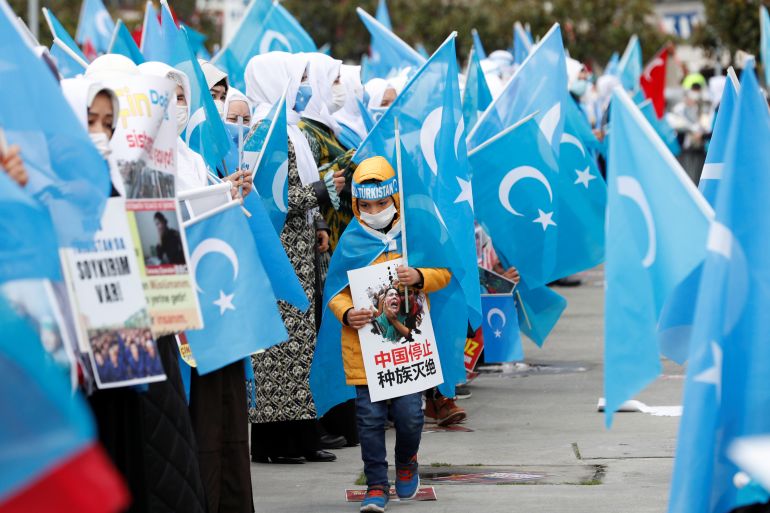Amnesty condemns Xinjiang’s ‘tragedy of Uighur family separation’
Rights group says China’s ‘ruthless detention campaign’ is preventing exiled Uighur families from reuniting with their children in Xinjiang.

Amnesty International has called on China to allow exiled Uighur parents to reunite with their children in Xinjiang without the fear of being sent to “oppressive” internment camps.
The human rights group on Friday released a new report describing the plight of six families living outside China who have been cut off from their children since 2017, when Beijing intensified its crackdown on the Uighurs, detaining more than a million members of the Muslim minority at what it called “vocational skills training centres”.
Keep reading
list of 4 itemsIs China losing control of the Uighur narrative?
Norway wealth fund to probe firms for Uighur labour links
China committing genocide against Uighurs, says report
At the time, the parents – some of whom had fled Xinjiang due to increased police harassment and others for education and jobs – had left one or more of their children in the care of their families in their hometowns.
The mothers and fathers believed they would soon be reunited with their children, but Beijing’s “ruthless detention campaign in Xinjiang” put them in “an impossible situation”, said Alkan Akad, Amnesty’s China researcher.
The parents, fearing persecution and arbitrary detention, could not return home to take care of their children. But the children were not allowed to leave and rejoin their families either.
“The tragedy of family separation in Xinjiang exposes the inhumanity of China’s efforts to control and indoctrinate Uighurs and other Muslim ethnic groups in the name of ‘countering terrorism’,” said Akad.
“China must end the measures that restrict the rights of all Muslim minorities to freely leave and return to the country. It must close all political ‘re-education camps’ and release detainees immediately, unconditionally and without prejudice,” he added.
There was no immediate comment from Beijing.
China has previously rejected allegations of any rights abuses in Xinjiang, saying the camps have been “extremely effective” in reducing “religious extremism” in the region.
‘My wife and I cry at night’
In a news release accompanying its Friday report, Amnesty said Uighurs overseas often hesitate to publicly talk about human rights abuses for fear of repercussions against their relatives in China. But it said the six families interviewed for the report decided to share their stories in the hope they might eventually be able to their children again.
Parents Mihriban Kader and Ablikim Memtinin told Amnesty they fled Xinjiang for Italy in 2016 because of police harassment, leaving their four children in the care of Kader’s parents.
Soon after they left, Kader’s mother was taken to a camp and her father was interrogated by the police.
“Our other relatives didn’t dare to look after my children after what had happened to my parents,” Kader told Amnesty. “They were afraid that they would be sent to the camps, too.”
The couple’s three youngest children were then sent to a state-run orphanage, while the eldest was placed in a boarding school. The couple were unable to contact them from Italy, but in November 2019, they received a permit from the Italian government to bring their children to join them.
The four children – aged between 12 and 16 – travelled alone across China to the Italian consulate in Shanghai, but they were seized by police and sent back to the orphanage and boarding school.
“Now my children are in the hands of the Chinese government and I am not sure I will be able to meet them again in my lifetime,” Kader said. “The thing that hurts most is that, to my children, it’s as if their parents don’t exist anymore; as if we passed away and they are orphaned.”
In another case, Omer and Maryem Faruh, who left two of their four daughters in the care of Meryem’s parents in 2016, told Amnesty they have not heard from their separated children in more than four years.
“My wife and I cry only at night, trying to hide our sorrow from our other kids here with us,” Omer said.
The Faruhs, who obtained Turkish citizenship in June last year, have been trying to enlist the help of the Turkish authorities to bring their two girls out of China.
And although the Turkish embassy in Beijing informed Omer it had initiated the relevant procedures in August 2020 and sent a diplomatic note to the Chinese government in October 2020, to date the Faruhs have not been able to bring the girls to Turkey.
‘Heartless policies’
“The heartbreaking testimonies of the parents we spoke to only scratches the surface of the scale of suffering endured by Uyghur families separated from their children,” said Amnesty’s Akad.
“The Chinese government must end its heartless policies in Xinjiang and ensure that families can be reunited as quickly as possible without fear of being sent to an oppressive camp.”
The report came as global pressure mounts on China for its treatment of the Uighurs.
The United States government and the Canadian and Dutch parliaments have labelled Beijing’s actions against the Uighurs “genocide”, and Washington has imposed sanctions on several Chinese officials over Xinjiang.
But China has rejected the genocide charge and warned Western countries not to interfere in its internal affairs.
Wang Yi, the Chinese foreign minister, told the United Nations Human Rights Council in February that “there has never been so-called genocide, forced labour or religious oppression in Xinjiang”.
He also invited the UN human rights commissioner to visit the closed-off region, but did not give a time frame.